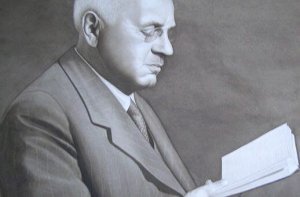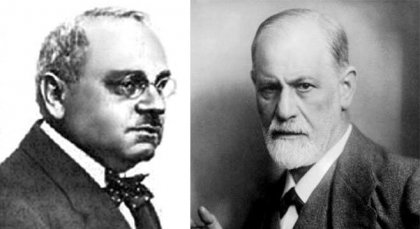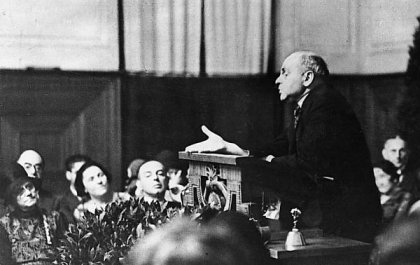Alfred Adler, Father of Individual Psychology

Alfred Adler was a Viennese doctor who made a great impact on theories about the human mind. Adler, Sigmund Freud and Carl Gustav Jung, make up “the big three.” In other words, they are the founders of what we know as “deep psychology.”
Adler was born in Vienna, Austria, on February 7th, 1870. He was the second of six children. His dad was a Jewish grain merchant and his mother was a housewife. He spent his childhood in the suburbs of the Austrian capital. His health was very delicate, partly because he suffered from rickets and partly because he was once hit by a car.
“No experience is a cause of success or failure. We do not suffer from the shock of our experiences, so-called trauma – but we make out of them just what suits our purposes.”
-Alfred Adler-
One of his siblings died of diphtheria when Adler was just 4 years old. In spite of the fact that they shared a bed, Adler did not contract the disease. He did, however, fall ill with severe pneumonia when was 5 years old, which affected him for the rest of his life. It was then that he decided to be a doctor. Otherwise, he was a normal child who was very extroverted and playful. He didn’t have any special inclination towards his studies, but he was very competitive.
Adler got his medical degree from the University of Vienna in 1895. That’s when he started working as an ophthalmologist. He had contact with people who were visually impaired, and there he started shaping his ideas about the human mind. Later on, he switched to general medicine. In his general practice, he saw patients from the circus. That experience influenced his ideas about inferiority and superiority, which he would develop later on. After that, he also worked as a neurologist and then as a psychiatrist.
The meeting between Alfred Adler and Freud
Thanks to his medical practice, Alfred Adler started to become interested in the phenomena of the human mind. Without any clear goal in mind, the young Viennese doctor started to collect material on the physical and psychic consequences of disabilities or organic limitations. In 1902 he met Sigmund Freud and was intrigued by his ideas.

Freud himself invited Adler to be part of his inner circle. Alfred Adler started to participate in the famous gatherings at Freud’s house. At first, they called it “The Wednesday Psychology Society,” and later it was dubbed “The Vienna Psychoanalytic Society.” In 1904, Adler expressed his disagreements with the Freudian theory for the first time. He did, however, remain part of the psychoanalytic society because his mentor expressly asked him to.
In 1910, he started editing the Psychoanalysis Magazine along with Freud and Stekel. Adler was the director of the publication. The tension with Freud’s theory grew, and in August 1911, Adler decided to separate himself permanently from traditional psychoanalysis. He announced it in an editorial of the magazine he directed.
Adler’s disagreements with classic psychoanalytic theory
Alfred Adler shared many hypotheses with Sigmund Freud. In fact, he never completely separated himself from them. Nevertheless, he also had serious reservations about certain things that the father of psychoanalysis focused on. Basically, Adler disagreed with Freud on two major points:
- Adler didn’t believe that the essential regulator of human behavior was sexual.
- He didn’t believe in the absolute determinism of the unconscious.

Unlike Freud, Adler thought that the basic human drive was willpower and not sexual instinct. Nietzsche’s philosophy strongly influenced Adler’s philosophy. He believed that a human being’s willpower was as important or more important than sex drive. He maintained that the frustration gave way to an inferiority complex. This, in turn, became a breeding ground for different psychological disorders.
At the same time, Alfred Adler rejected the idea that our first experiences stay in the unconscious and determine our mental lives. On the contrary, he placed enormous value on the individual’s ability to give direction and meaning to his life in the here and now.
The foundation of Adler’s theory came from his observations of his patients. Many of them carried a long history of physical limitations. He found that some people turned the experiences into motivation to develop original ways to compensate for their limitations. Others, however, let their frustrations weigh them down and couldn’t move forward. Based on those observations, Adler placed great importance on human willpower to overcome hardships.
Alfred Adler’s Individual Psychology
In 1911, Adler founded the Society for Free Psychoanalytic Research. In 1912, he changed the named to The Society for Individual Psychology. The name “individual psychology” might seem contradictory considering that Adler believed that social factors and surroundings were important to an individual’s well-being. Adler coined the term “individual” because he believed that the heavy social influence has a distinct effect on each person. This reasoning is similar to the one we referred to earlier about disability.

One of the first concepts that Adler posited was that of “compensation.” It was based on a model of “constitutional pathology” and asserted that the body automatically compensates for any organic insufficiency. This compensation starts in the mind and then translates to the body. As an ophthalmologist, he observed that many patients with significant vision problems were excellent readers.
According to Adler, the main driving force in each individual is willpower. However, when this drive is hindered, that’s when what he called the “inferiority complex” emerges. This is a neurotic feeling of inability or incompetency derived from experiences and surroundings. To compensate for this condition, the individual develops a “superiority complex.” This involves feeling disproportionately high perceptions and desires of oneself.
In these cases, the process of compensation leads to two available options. One, the individual compensates his feeling of inferiority by developing new potential. The other is that the individual is trapped by the feeling of inferiority and develops an unhealthy superiority complex. This leads them to cynicism, frustration, indifference, and even crime.
Alfred Adler’s legacy
Alfred Adler’s legacy had an important impact during its time. Not only was it popular in Europe, but also in the United States. There, he was a successful speaker and even a visiting professor to prestigious universities. All of this in spite of the fact that his books and ideas were banned in his homeland and in many places in Europe during the rise of the Nazis.
The emphasis on individual will and the ability of the individual to modify his or her destiny had a large impact on later schools of thought. These includes Humanist Psychology, Erich Fromm’s Social Psychoanalysis, and Viktor Frankl’s Logotherapy. In addition, self-help psychology frequently employs many of his theories.
The basic tenets of individual psychology were laid out in his book The Neurotic Character, published in 1912. Other works that define his legacy are The Practice and Theory of Individual Psychology (1920); “The Knowledge of Man (1926); Understanding Human Nature (1928-1930); The Education of Children; The Science of Living (1957); and Superiority and Social Interest (Posthumus work of 1965.)
Alfred Adler was a Viennese doctor who made a great impact on theories about the human mind. Adler, Sigmund Freud and Carl Gustav Jung, make up “the big three.” In other words, they are the founders of what we know as “deep psychology.”
Adler was born in Vienna, Austria, on February 7th, 1870. He was the second of six children. His dad was a Jewish grain merchant and his mother was a housewife. He spent his childhood in the suburbs of the Austrian capital. His health was very delicate, partly because he suffered from rickets and partly because he was once hit by a car.
“No experience is a cause of success or failure. We do not suffer from the shock of our experiences, so-called trauma – but we make out of them just what suits our purposes.”
-Alfred Adler-
One of his siblings died of diphtheria when Adler was just 4 years old. In spite of the fact that they shared a bed, Adler did not contract the disease. He did, however, fall ill with severe pneumonia when was 5 years old, which affected him for the rest of his life. It was then that he decided to be a doctor. Otherwise, he was a normal child who was very extroverted and playful. He didn’t have any special inclination towards his studies, but he was very competitive.
Adler got his medical degree from the University of Vienna in 1895. That’s when he started working as an ophthalmologist. He had contact with people who were visually impaired, and there he started shaping his ideas about the human mind. Later on, he switched to general medicine. In his general practice, he saw patients from the circus. That experience influenced his ideas about inferiority and superiority, which he would develop later on. After that, he also worked as a neurologist and then as a psychiatrist.
The meeting between Alfred Adler and Freud
Thanks to his medical practice, Alfred Adler started to become interested in the phenomena of the human mind. Without any clear goal in mind, the young Viennese doctor started to collect material on the physical and psychic consequences of disabilities or organic limitations. In 1902 he met Sigmund Freud and was intrigued by his ideas.

Freud himself invited Adler to be part of his inner circle. Alfred Adler started to participate in the famous gatherings at Freud’s house. At first, they called it “The Wednesday Psychology Society,” and later it was dubbed “The Vienna Psychoanalytic Society.” In 1904, Adler expressed his disagreements with the Freudian theory for the first time. He did, however, remain part of the psychoanalytic society because his mentor expressly asked him to.
In 1910, he started editing the Psychoanalysis Magazine along with Freud and Stekel. Adler was the director of the publication. The tension with Freud’s theory grew, and in August 1911, Adler decided to separate himself permanently from traditional psychoanalysis. He announced it in an editorial of the magazine he directed.
Adler’s disagreements with classic psychoanalytic theory
Alfred Adler shared many hypotheses with Sigmund Freud. In fact, he never completely separated himself from them. Nevertheless, he also had serious reservations about certain things that the father of psychoanalysis focused on. Basically, Adler disagreed with Freud on two major points:
- Adler didn’t believe that the essential regulator of human behavior was sexual.
- He didn’t believe in the absolute determinism of the unconscious.

Unlike Freud, Adler thought that the basic human drive was willpower and not sexual instinct. Nietzsche’s philosophy strongly influenced Adler’s philosophy. He believed that a human being’s willpower was as important or more important than sex drive. He maintained that the frustration gave way to an inferiority complex. This, in turn, became a breeding ground for different psychological disorders.
At the same time, Alfred Adler rejected the idea that our first experiences stay in the unconscious and determine our mental lives. On the contrary, he placed enormous value on the individual’s ability to give direction and meaning to his life in the here and now.
The foundation of Adler’s theory came from his observations of his patients. Many of them carried a long history of physical limitations. He found that some people turned the experiences into motivation to develop original ways to compensate for their limitations. Others, however, let their frustrations weigh them down and couldn’t move forward. Based on those observations, Adler placed great importance on human willpower to overcome hardships.
Alfred Adler’s Individual Psychology
In 1911, Adler founded the Society for Free Psychoanalytic Research. In 1912, he changed the named to The Society for Individual Psychology. The name “individual psychology” might seem contradictory considering that Adler believed that social factors and surroundings were important to an individual’s well-being. Adler coined the term “individual” because he believed that the heavy social influence has a distinct effect on each person. This reasoning is similar to the one we referred to earlier about disability.

One of the first concepts that Adler posited was that of “compensation.” It was based on a model of “constitutional pathology” and asserted that the body automatically compensates for any organic insufficiency. This compensation starts in the mind and then translates to the body. As an ophthalmologist, he observed that many patients with significant vision problems were excellent readers.
According to Adler, the main driving force in each individual is willpower. However, when this drive is hindered, that’s when what he called the “inferiority complex” emerges. This is a neurotic feeling of inability or incompetency derived from experiences and surroundings. To compensate for this condition, the individual develops a “superiority complex.” This involves feeling disproportionately high perceptions and desires of oneself.
In these cases, the process of compensation leads to two available options. One, the individual compensates his feeling of inferiority by developing new potential. The other is that the individual is trapped by the feeling of inferiority and develops an unhealthy superiority complex. This leads them to cynicism, frustration, indifference, and even crime.
Alfred Adler’s legacy
Alfred Adler’s legacy had an important impact during its time. Not only was it popular in Europe, but also in the United States. There, he was a successful speaker and even a visiting professor to prestigious universities. All of this in spite of the fact that his books and ideas were banned in his homeland and in many places in Europe during the rise of the Nazis.
The emphasis on individual will and the ability of the individual to modify his or her destiny had a large impact on later schools of thought. These includes Humanist Psychology, Erich Fromm’s Social Psychoanalysis, and Viktor Frankl’s Logotherapy. In addition, self-help psychology frequently employs many of his theories.
The basic tenets of individual psychology were laid out in his book The Neurotic Character, published in 1912. Other works that define his legacy are The Practice and Theory of Individual Psychology (1920); “The Knowledge of Man (1926); Understanding Human Nature (1928-1930); The Education of Children; The Science of Living (1957); and Superiority and Social Interest (Posthumus work of 1965.)
This text is provided for informational purposes only and does not replace consultation with a professional. If in doubt, consult your specialist.







